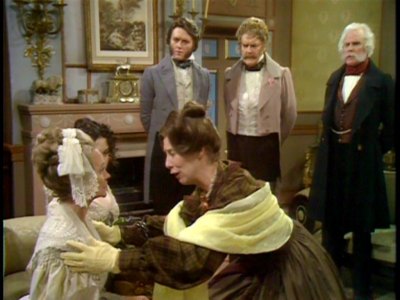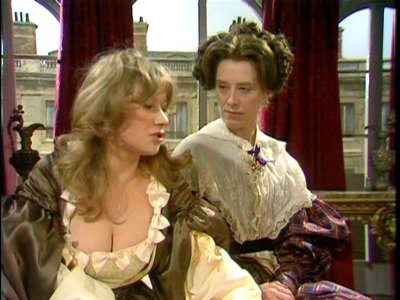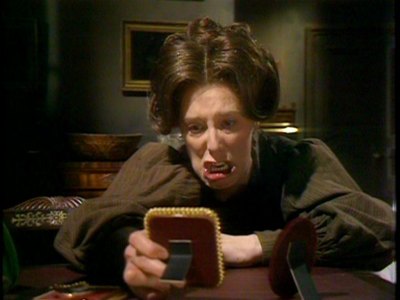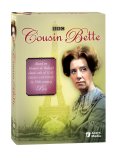| Reviews & Columns |
|
Reviews DVD TV on DVD Blu-ray 4K UHD International DVDs In Theaters Reviews by Studio Video Games Features Collector Series DVDs Easter Egg Database Interviews DVD Talk Radio Feature Articles Columns Anime Talk DVD Savant Horror DVDs The M.O.D. Squad Art House HD Talk Silent DVD
|
DVD Talk Forum |
|
|
| Resources |
|
DVD Price Search Customer Service #'s RCE Info Links |
|
Columns
|
|
|
Cousin Bette
Cousin Bette is the 1971 BBC dramatization of French realist Honore de Balzac's famous novel of social class, greed, and revenge among the minor aristocracy. Starring a notable cast of British stage and TV actors, including Margaret Tyzack (The Forsyte Saga), Helen Mirren (the Prime Suspect TV shows), Colin Baker (Doctor Who), Thorley Walters (Tinker, Tailor, Soldier, Spy), and Ursula Howells (The Cazalets), this video version of Cousin Bette allows Balzac's social commentary to take root through the well-observed screenplay, while the fast-paced mechanics of the revenge plot roll along, keeping the viewer "turning the page," so to speak. The actors are almost all spot-on; although the central performance by Tyzack has tonal difficulties that occasionally upstage the balance of the other players.

Bette Fischer (Margaret Tyzack) is the poor country cousin of Adeline Hulot (Ursula Howells), a wealthy member of a minor aristocratic family living in Paris. Still an included member of the family (she often dines at the family estate - in hand-me-down gowns from her cousin), Bette lives in a run-down flat, where she maintains her independence from the Hulot family by sewing intricate needlepoint crafts. One night, smelling smoke, she enters an adjoining apartment and discovers Count Steinbock (Colin Baker), a penniless Polish exile and failed sculptor who has stopped up his stove flue in an effort to commit suicide. Bette, taken with his suicide note, recognizes another poor exile, and nurses him back to health. She also agrees to sponsor his schooling to advance his sculpting, in exchange for monetary payback when he becomes successful. Soon, she falls in love with him, although she doesn't let on to him about her feelings.
Meanwhile, there's trouble in the Hulot home. Baron Hector Hulot (Thorley Walters) is rapidly squandering the family fortune on a variety of mistresses. Crevel (John Bryans), a wealthy bourgeois merchant who's daughter has married into the Hulot family, holds an abiding grudge against Hector for stealing his mistress away from him. And Johann Fischer (Robert Speaight) has borrowed excessive sums of money to help Hector with his growing debts. Hortense Hulot (Harriett Harper), Hector and Adeline's daughter, and confidante of Bette, grows increasingly suspicious of Bette's stories concerning her Polish count, and challenges Bette to prove his existence. Bette and Steinbock concoct a plan to get his small sculptures noticed by the aristocracy, which eventually leads to Steinbock being courted by the Hulot family, after Hortense confides in her father that she's found love at first sight with Steinbock.
When Bette finds out that Steinbock has given his heart to Hortense, this is the final straw for Bette, who feels that the Hulot family has taken the only thing that she's ever loved. With the aid of Valerie Marneffe (Helen Mirren), who has given herself to Hector to aid her husband's civil service career, Bette plots an all-out assault on the Hulot family, insinuating herself into the family's confidences (and using Valerie's skills at lovemaking) to pick them off, one by one.

Adapted by Ray Lawler and directed by Gareth Davies, Cousin Bette skillfully moves through the lengthy plot of Balzac's novel, maintaining a breathless pace to the proceedings that's a welcome relief from the sometimes staid and stately tempo of other BBC productions from the 1970s. Cousin Bette does suffer at times from a creaky technical execution that's a hallmark of early BBC television productions; shot on video, Cousin Bette looks fairly rough, with inconsistent lighting, and camera movements and actor blocking that can seem haphazard at times. However, for a production such as this, the performances are key, and the actors in Cousin Bette are all top-notch. Particularly affecting is Helen Mirren in the key role of Valerie. Mirren must be believable as a woman who prostitutes herself for money and influence, and she's quite good at making us believe that any number of men would want her sensual charms. Thorley Walters (a particular favorite of mine from the famous Boulting Brothers comedies) manages to get across Hector's crucial weakness for the flesh, while emphasizing his total lack of comprehension as to where his tragic actions are leading his family. And Ursula Howells does quite well with the difficult part of Adeline, particularly in her scene where, in desperation, she offers herself to Crevel to pay off her husband's debts.
Where I had difficulties with Cousin Bette concerned, unfortunately, the lead performance by Margaret Tyzack. Certainly, Tyzack has proven herself to be one of England's leading stage performers, and her craft is not in doubt. And her take on the character is quite invigorating; Tyzack's Bette may be sly and crafty after years of being underestimated and ignored, but she's no retiring wallflower. She's full of passion, heat and rage. Hers is not a quiet scheme of revenge, but a lusty, full-throttled assault on all the perceived wrongs that she feels have been visited on her. Unfortunately, there are times when Tyzack's technical execution takes into account this character motivation too literally, resulting in some critical, over-the-top moments. The scene when she discovers that Steinbock has given his heart to Hortense, is ridiculously overwrought, and frankly, laughable. Complete with animal growls and grotesque grimaces and eye rolling, Tyzack buries the scene in bathos, not tragedy. Tyzack's final scene, which I won't detail for fear of spoiling the third act of the film, is equally ludicrous. Whenever I see a good actor overdoing it in a film, my first impulse is to blame the actor. But truly, such an occurrence only happens at the will (or absence) of the director's guiding hand. Regardless of who's choice it was, Tyzack's performance, at many times effective, at other times off the mark, does upset the perfect balance of the other performers.

The DVD:
The Video:
There's nothing wrong with the full-screen two-disc transfer of Cousin Bette; the rough picture quality comes from the original video source materials -- as the BBC acknowledges on the DVD box.
The Audio:
The Dolby Digital mono audio track accurately reflects the original TV presentation of the soundtrack.
The Extras:
There is a text biography of author Honore de Balzac, along with text bios on selected members of the cast.
Final Thoughts:
I thoroughly enjoyed this 1971 BBC production of Balzac's Cousin Bette. The plot moves swiftly and surely, and the performances are first-rate. While lead actress Tyzack occasionally indulges in histrionics, she still provides a riveting look at a cold, calculating, venomous woman scorned. If you love BBC dramas, or are nostalgic for the glory years of PBS's Masterpiece Theatre (where Cousin Bette first premiered in America), I recommend Cousin Bette.
Paul Mavis is an internationally published film and television historian, a member of the Online Film Critics Society, and the author of The Espionage Filmography.


|
| Popular Reviews |
| Sponsored Links |
|
|
| Sponsored Links |
|
|
| Release List | Reviews | Shop | Newsletter | Forum | DVD Giveaways | Blu-Ray | Advertise |
|
Copyright 2024 DVDTalk.com All Rights Reserved. Legal Info, Privacy Policy, Terms of Use,
Manage Preferences,
Your Privacy Choices | |||||||














